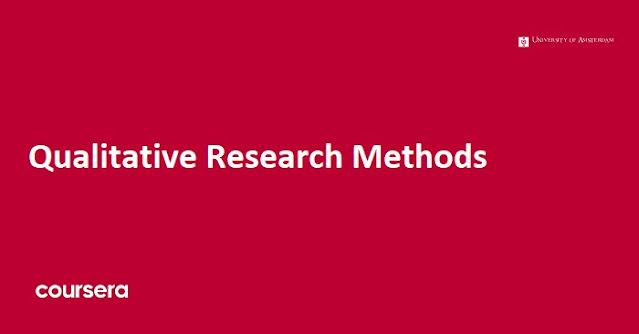Qualitative Research Methods
This course is part of the Methods and Statistics in Social Sciences Specialization
About this Course
In this course you will be introduced to the basic ideas behind the qualitative research in social science. You will learn about data collection, description, analysis and interpretation in qualitative research. Qualitative research often involves an iterative process. We will focus on the ingredients required for this process: data collection and analysis.
You won't learn how to use qualitative methods by just watching video's, so we put much stress on collecting data through observation and interviewing and on analysing and interpreting the collected data in other assignments.
Obviously, the most important concepts in qualitative research will be discussed, just as we will discuss quality criteria, good practices, ethics, writing some methods of analysis, and mixing methods.
Flexible deadlines
• Reset deadlines in accordance to your schedule.
Shareable Certificate
• Earn a Certificate upon completion
100% online
• Start instantly and learn at your own schedule.
Course 2 of 5 in the
• Methods and Statistics in Social Sciences Specialization
Intermediate Level
Approx. 24 hours to complete
English
• Subtitles: Arabic, French, Portuguese (European), Italian, Vietnamese, German, Russian, English, Spanish
Offered by University of Amsterdam
A modern university with a rich history, the University of Amsterdam
(UvA) traces its roots back to 1632, when the Golden Age school Athenaeum Illustre was established to train students in trade and philosophy. Today, with more than 39,000 students, 5,000 staff and 285 study programmes (Bachelor's and Master's), many of which are taught in English, and a budget of more than 600 million euros, it is one of the largest comprehensive universities in Europe. It is a member of the League of European Research Universities and also maintains intensive contact with other leading research universities around the world.
Syllabus - What you will learn from this course
Week 1 - Philosophy of Qualitative Research
Welcome to the first week of the course. We start with an introduction, followed by two lessons on the Philosophy of Qualitative Research.
Week 2 - Observation
In the first module we discussed the philosophy of qualitative research, explaining some basic notions and general philosophical approaches. In this second module we'll discuss observation as an important method within qualitative research. What types of observation are there? How do we observe? And how do we analyse and describe our data?
Week 3 - Good Practices & Criteria
What makes qualitative research 'good' is a rather difficult question. Different criteria are suggested, but within the field of qualitative research there is not much agreement on these criteria. However, there is quite some agreement on what good practices of qualitative research are. In this module we will start in lesson 1 with a discussion of good practices of qualitative research.
Week 4 - Qualitative Interviewing
In this module we'll look at what a qualitative interview entails by trying to define it and by discussing different forms of interviewing behaviour.
Week 5 - Qualitative Analysis
In previous modules we discussed how you should observe a social situation or conduct a qualitative interview. Now we will focus on what to do with your data, by discussing qualitative analysis. In this module you will try to do a qualitative analysis by interpreting your observed data and try to code it.
Week 6 - Writing, mixing & ethics
In this module I will discuss ideas on writing in qualitative research, I will discuss mixing methods and talk about the ethical issues you should consider.
Week 7 - Catch up week
In this module there's no new material. The only requirement in this module is that you finish up the final peer review assignment.
Week 8 - Exam week
This is the final module, where you can apply everything you've learned up until now in the final exam. Please note that you can only take the final exam once every day, so make sure you are fully prepared to take the test. Please follow the honor code and do not communicate or confer with others taking this exam. Good luck! Once you've taken the exam, please consider doing the other courses in our specialisation track. I hope it was an enjoyable experience. If it was, please consider joining in with the Massive Open Online Research by my colleague Christian Bröer. Thanks for all your hard work, feedback and interpretations, the course team and your fellow learners really appreciate it!
About the Methods and Statistics in Social Sciences Specialization
Identify interesting questions, analyze data sets, and correctly interpret results to make solid, evidence-based decisions.
This Specialization covers research methods, design and statistical analysis for social science research questions. In the final Capstone Project, you’ll apply the skills you learned by developing your own research question, gathering data, and analyzing and reporting on the results using statistical methods.

|
|
Our task is to centralize the largest number of courses, training, tutorials, videos to make it easier for you to search when you want to train.
Generally, we incorporate those that are free, but if we find some interesting ones that are paid, we add them so that your training is more profitable and professional.
Keep training yourself to become a better professional or simply for personal achievements, cheer up, don't give up and go ahead !!!.
Good luck !!! The team of:
|
